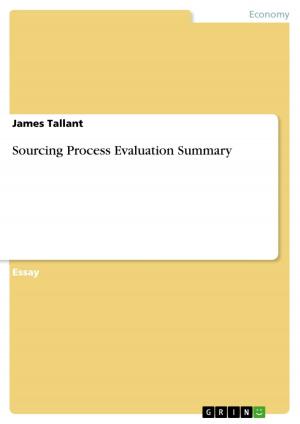| Author: | Natalie Zonis | ISBN: | 9783640803507 |
| Publisher: | GRIN Publishing | Publication: | January 18, 2011 |
| Imprint: | GRIN Publishing | Language: | English |
| Author: | Natalie Zonis |
| ISBN: | 9783640803507 |
| Publisher: | GRIN Publishing |
| Publication: | January 18, 2011 |
| Imprint: | GRIN Publishing |
| Language: | English |
Seminar paper from the year 2010 in the subject Business economics - Business Management, Corporate Governance, grade: 1,7, University of Applied Sciences Berlin (International Management), language: English, abstract: Once again Russia's positive economic development outlook has been thrown into question by the global financial crisis. The country has faced a whole lot of economic problems in the past months. Russians have withdrawn 290 billion Dollars from the country's banks in fear of a financial collapse. At first sight on the past two years' events on Russia's financial market one may have had an impression of a 'déjà-vu': Since August 2008: the Rouble has dropped about one third against the Euro over 30 percent and against the Dollar even more than 40 percent.2 The incoming foreign investment of 28 billion Dollars which broke all records right in the year before has now shrunk up to a few billion. The country's two stock markets, the Russian Trading System (RTS) and the Moscow Interbank Currency Exchange (MICEX), have fallen 78 percent and 67 percent respectively since their highs in May 2008.3 It appears as some cynical 10th anniversary of 17th of August 1998: when the Russian Government announced the gradual devaluation of the Rouble, the default on domestic and foreign debts, and declared a moratorium on payment by Russian commercial banks to foreign creditors. So the Rouble has dropped to the Dollar more than 300percent in the following months and was six times lower only a year after. At the outset this paper sets the currency crisis into the framework of the macroeconomic theory and provides a historical overview by putting the 1998 crisis into its timeframe and showing the impacts on the Russian economy. Furthermore the following questions are discussed: Why did the Rouble collapse? Was this a home-made crisis or was it caused by exogenous factors such as the foregone turmoil on Asia's financial markets? Finally it shows what the conditions under which an economy can become vulnerable to a currency crisis are, what are and the right and the wrong options to resolve it and the lessons learned.
Seminar paper from the year 2010 in the subject Business economics - Business Management, Corporate Governance, grade: 1,7, University of Applied Sciences Berlin (International Management), language: English, abstract: Once again Russia's positive economic development outlook has been thrown into question by the global financial crisis. The country has faced a whole lot of economic problems in the past months. Russians have withdrawn 290 billion Dollars from the country's banks in fear of a financial collapse. At first sight on the past two years' events on Russia's financial market one may have had an impression of a 'déjà-vu': Since August 2008: the Rouble has dropped about one third against the Euro over 30 percent and against the Dollar even more than 40 percent.2 The incoming foreign investment of 28 billion Dollars which broke all records right in the year before has now shrunk up to a few billion. The country's two stock markets, the Russian Trading System (RTS) and the Moscow Interbank Currency Exchange (MICEX), have fallen 78 percent and 67 percent respectively since their highs in May 2008.3 It appears as some cynical 10th anniversary of 17th of August 1998: when the Russian Government announced the gradual devaluation of the Rouble, the default on domestic and foreign debts, and declared a moratorium on payment by Russian commercial banks to foreign creditors. So the Rouble has dropped to the Dollar more than 300percent in the following months and was six times lower only a year after. At the outset this paper sets the currency crisis into the framework of the macroeconomic theory and provides a historical overview by putting the 1998 crisis into its timeframe and showing the impacts on the Russian economy. Furthermore the following questions are discussed: Why did the Rouble collapse? Was this a home-made crisis or was it caused by exogenous factors such as the foregone turmoil on Asia's financial markets? Finally it shows what the conditions under which an economy can become vulnerable to a currency crisis are, what are and the right and the wrong options to resolve it and the lessons learned.















